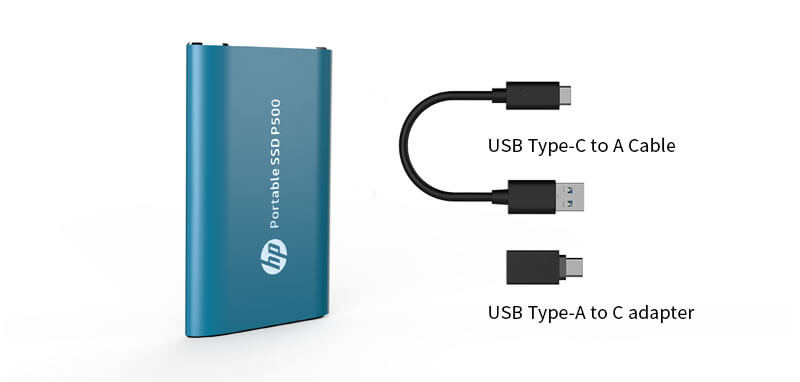Table of Contents
amazon HP Portable SSD P500 reviews
HP’s P500 Portable SSD is an attractive, compact external SSD with a sturdy aluminum body. It’s a good basic option for everyday use, but don’t expect anything like cutting-edge speed.
Of course, HP is better known for its printers and PCs, but the company also maintains a stable flash storage system. With the P500 handy portable SSD (starts at $74.99 for 500GB; $109.99 for the 1TB model we tested), the company offers go-anywhere mobility, rugged design, ruggedness, and fast speed of today’s external SSDs for its budget line offerings. It may be a side performer for gaming (and compared to advanced external SSDs like the Seagate FireCuda Gaming SSD), but this SSD should perform well under normal use and come with a three-year warranty practice.
Design: Speed Metal
HP offers the P500 in three storage capacities: 250GB, 500GB, and 1TB. You’ll pay about 15 cents per gigabyte for the 500GB model and almost 11 cents per gigabyte for the 1TB. The 1TB model would be the best option for the raw cost-per-performance value.
At 10.9 cents/gigabyte for the 1TB model, the P500 is cheaper than other basic external SSDs we’ve reviewed, like the Patriot PXD Portable SSD. The P500 with a smaller capacity of 500GB is more expensive, but it doesn’t outperform other drives of the same size.
The frame of this SSD is smaller than a business card and could theoretically fit into a wallet (though not recommended). The P500 measures 0.39 x 2.1 inches x 3.1 inches (HWD) and weighs just 2.1 ounces. It’s one of the smallest external SSD chassis that doesn’t come in the form of a USB stick.
The drive comes with minimal matching packaging with a USB Type-C-to-A cable, a USB Type-A-to-C adapter, and an instruction manual. The appropriate drive has a USB-C port to accept the cable.
The drive has a minimalist design, with the HP logo on one side and the name on the other. Black, silver, red and blue chassis options are available. HP also offers a sibling SSD, the P700 Portable SSD, slightly larger and rated for faster reads and writes. Aside from the small size difference, there is no visual difference between the two.
Test P500 Portable SSD: Normal Serial ATA Speed
The P500 portable SSD uses a Silicon Motion SM3350 controller paired with Samsung’s NAND chip. The internals of this drive is based on Serial ATA, as opposed to PCI Express, so the performance ceiling, we suspect, will be fairly predictable. It supports USB 3.1 Gen2 speeds over USB Type-C or Type-A, and it works with Windows, macOS, and Linux. There is no preloaded software on the SSD, such as drive cloning/cloning utilities or any maintenance software. That is just as basic as an SSD.
We ran our usual suite of SSD tests on the P500 Portable SSD, which includes Crystal DiskMark 6.0, UL’s PCMark 10 Memory, BlackMagic’s Disk Speed Test, and our directory transfer test. The first two were run on a PC with an NTFS formatted drive, and the latter two were on a 2016 MacBook Pro using exFAT.
Performance is far from the top of the charts but is good for most users in normal, day-to-day use. Any difference between it and a PCI Express-based model can be very modest when transferring small files. (For example, on our folder copy test, the 1TB Portable SSD P500 performed a folder-to-folder copy of our sample 1.2GB folder in 6 seconds.) But Expect to feel slower if you’re a gamer or when copying or reading very large files and folders. This drive is slow even for a SATA-based model, although it will still be faster than a hard drive.
HP rates 250GB and 500GB versions of the drive for sequential read speeds of up to 380MBps and sequential writes of up to 200MBps. The 1TB instance we tested rated 420MBps and 268MBps higher, respectively, but our tests showed it to be slower most of the time than competitors; even hard drives value disk-like ADATA SE800. It will be faster than any portable hard drive, but it is the best base for an external SSD in 2020.
Conclusion: A good average external SSD
The P500 has a sleek design and is competitively priced per gigabyte. The SSD is suitable for most everyday use, but we don’t recommend it for reading or writing large, heavy files or folders continuously if what you do.
If speed is your main criterion, choose a model with an interface that supports USB 3.2 Gen 2 and PCI Express-based internals, such as the Crucial X8 SSD or the Seagate FireCuda Gaming. However, if you can get the P500 for the lowest price depending on the reseller, it should serve you well enough if all you need is basic storage — and you’re patient.
